Trace Your Share: San Jose Sico Landfill cooperative
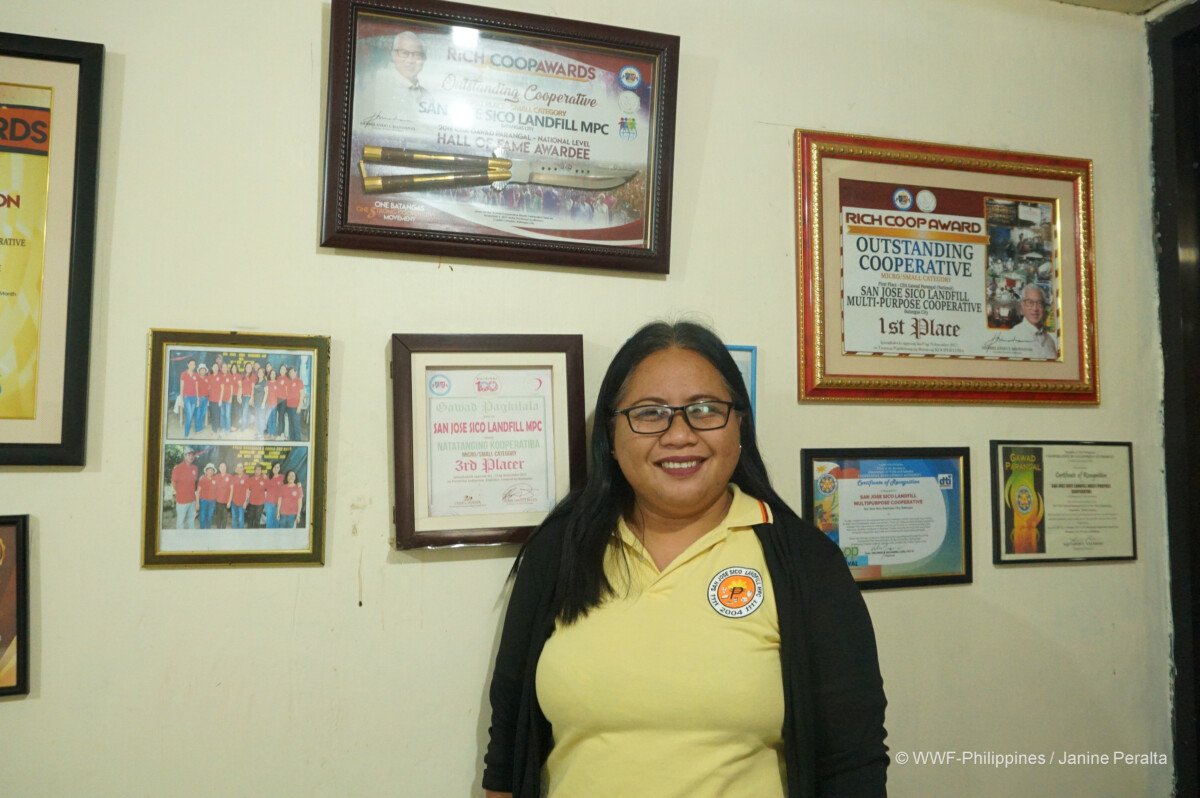
Sherryl Hernandez is the General Manager of the San Jose Sico Landfill Multipurpose Cooperative. She has served the cooperative since 2014.
“We wish to see that the landfills are no longer filling up quickly with waste, and small organizations or cooperatives like us that are engaged in solid waste collection are part of a chain and have roles to play that will help or be helped by EPR ,” said Sherryl Hernandez, General Manager of San Jose Sico Landfill Multipurpose Cooperative in the Philippines.
The San Jose Sico Landfill Multipurpose Cooperative in Batangas province is part of the waste management sector whose initiative in collection, sorting, and recycling helps the province to better manage plastic wastes in the Philippines. Registered in 2003, the cooperative is managing five tons of plastics and food waste daily and turning the recyclables into hollow blocks.
A study by WWF Philippines found that Filipinos generate about 2.15 million metric tons of plastic per year of which only 9% is recycled while 35% ends up in an open environment. In 2019, another study by the Global Alliance for Incinerator Alternatives found that the average Filipino uses 591 sachets per year and a whopping total of 164 million sachets are thrown away each day.
However, the Philippines now has an Extended Producer Responsibility (EPR) Law which requires manufacturers to trace and recover the trail of their plastic products and adopt product designs that would be safer for the environment. The law will affect everyone, not just producers and manufacturers, and as lawmakers are working on drafting the implementing rules and regulations (IRR), it is important to hear the inputs of relevant stakeholders.
Engaging the sector
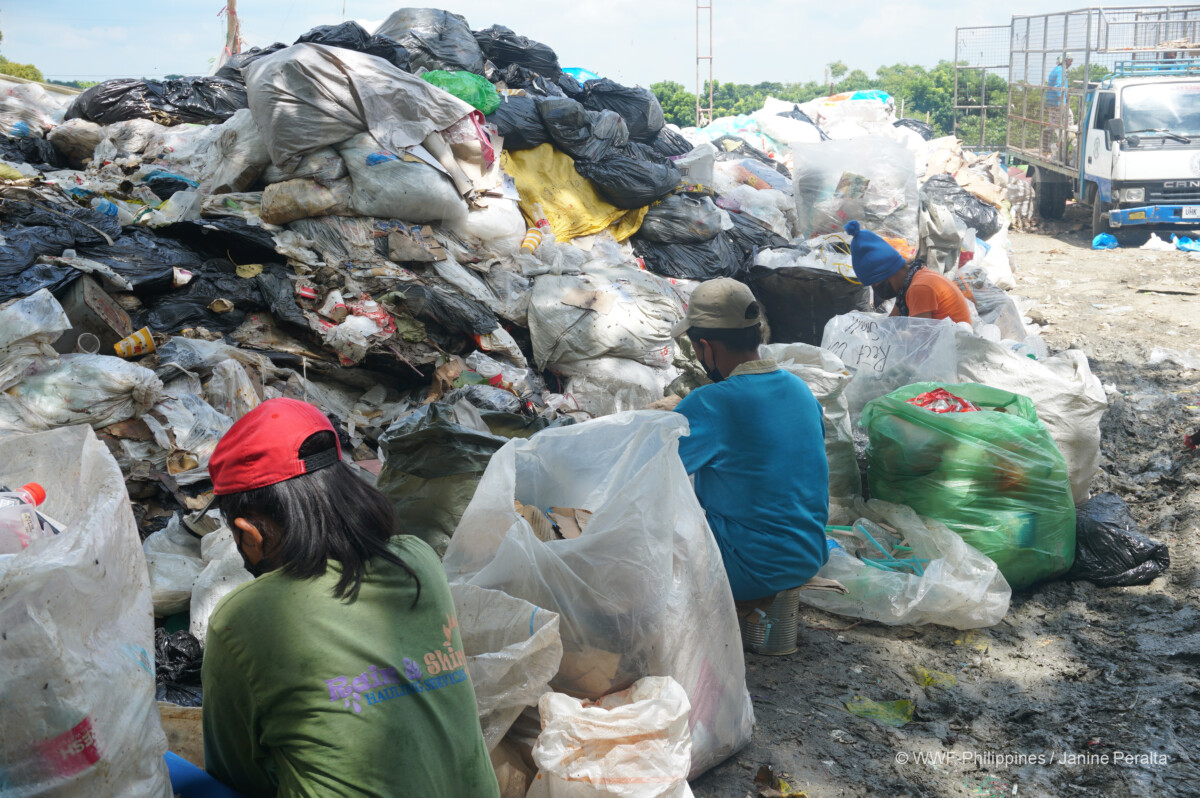
Sorters search through mounds of trash to collect plastics that can be recycled.
The San Jose Sico Landfill Multipurpose Cooperative was one of the participants who attended WWF Philippines’ Extended Producer Responsibility (EPR) multi-stakeholder dialogue with the waste management sector on July 21, 2022 in Pasig City. There were 17 participants from nine local government units and waste management operators.
The sector is a key stakeholder given that they are responsible for sorting through the garbage to collect recyclable materials and other divertible waste.
The dialogue sought to gather insights from multiple stakeholders on the EPR law and the EPR system itself. These inputs will be added to the WWF Philippines’ EPR toolkit which will serve as a guide for policymakers while crafting the implementing rules and regulations of the EPR law.
The dialogues and the EPR toolkit, as well as a white paper with the insights of the stakeholders, are funded by the UN Environment Programme’s (UNEP) SEA circular project. The SEA circular project seeks to inspire market-based solutions and encourage enabling policies to solve marine plastic pollution at the source.
Apart from funding, the project pushes for a human rights-based approach in the EPR scheme that will be implemented in the Philippines. UNEP works closely with WWF Philippines as the latter develops the toolkit and white paper that aims to communicate this approach while ensuring that all sectors are integrated into it.
The current EPR law lists big businesses as the only entities obliged to implement an EPR system. However, the impact of this law is seen to affect people from all levels of waste management including the local government, landfill cooperatives, small businesses and civil society organizations. Not to mention the general public. It is important to hear the perspectives of different sides since they all have a stake in the EPR.
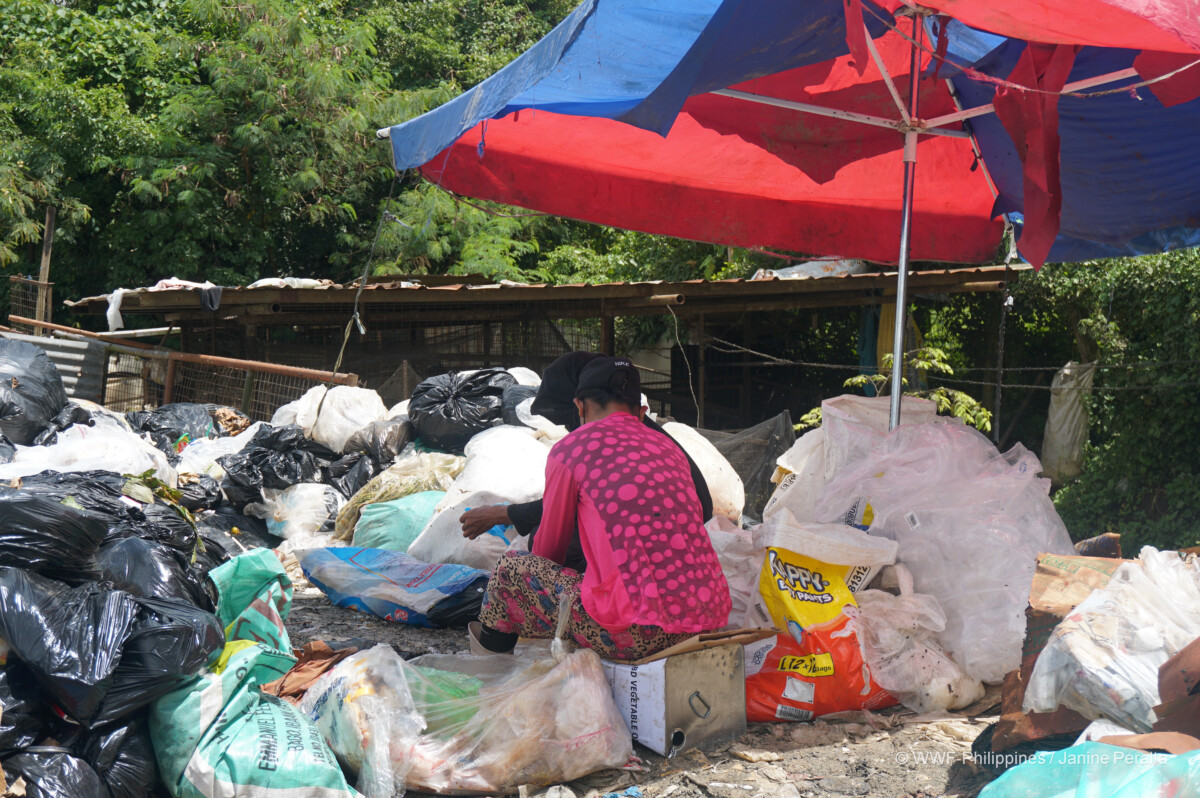
Food waste sorters search for scraps that can be converted into organic fertilizer.
With the EPR bill lapsing into law in July 2022, the Philippines seeks to reduce plastic pollution by requiring big brands and businesses to recover a portion of their plastic packaging waste. Failure to do so would mean paying a fine or even losing their business license.
The requirement is to reduce their plastic footprint by 20% in 2023 compared to the year before, 40% in 2024, increasing by 10% each year leading to 2028. Then in the years following 2028, the businesses must retain an 80% annual plastic recovery rate.
The implementing rules and regulations should be drafted 90 days after the bill’s lapse into law.
Doing their part
The San Jose Sico Landfill Multipurpose Cooperative started its journey as a small group with one small office without any sorting areas. Later in 2005, they set up a sorting area of over 3,000 square meters to store the garbage. The cooperative now has six staff members, 10 sorters and 17 drivers and helpers. The drivers and helpers are also tasked to sort through the garbage hauls with the sorters in daily morning and nights shifts.
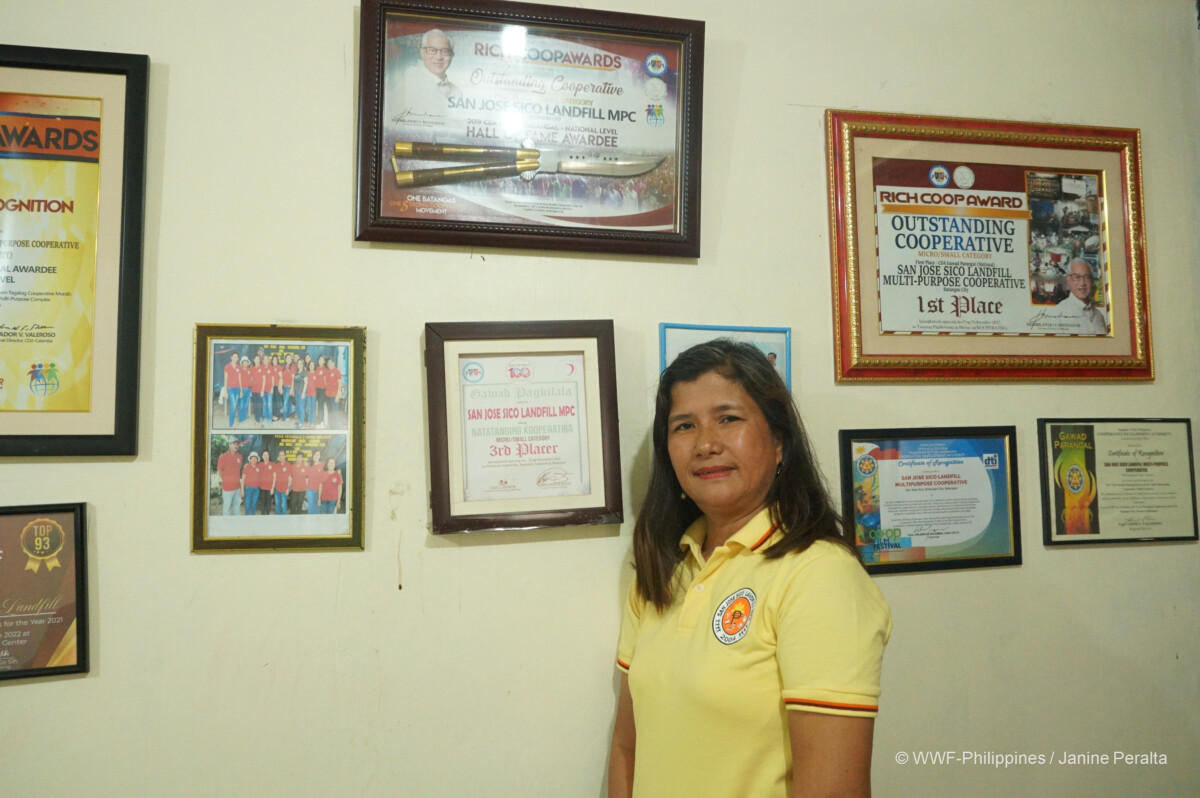
Emeteria Hernandez is the chairperson of the San Jose Sico Landfill Multipurpose Cooperative which has been operating since 2003.
Emeteria Hernandez, chairperson of the San Jose Sico Landfill Multipurpose Cooperative, says in Filipino, “The landfill receives five tons of plastic and food waste from 48 establishments, mostly fast-food chains, on a daily basis”.
The landfill’s sorters rummage through the trash to collect recyclable plastic materials and segregate them according to their types, before they sell them to interested buyers or make them into cement. The cooperative then produces hollow blocks from the cement.
Meanwhile, the food waste that they collect is converted into fertilizer or fed to black soldier flies whose feces can be made into fertilizer as well.
Emeteria further added that it’s difficult to sort plastics because of their varieties – while some can still be made use of, some cannot be used again.
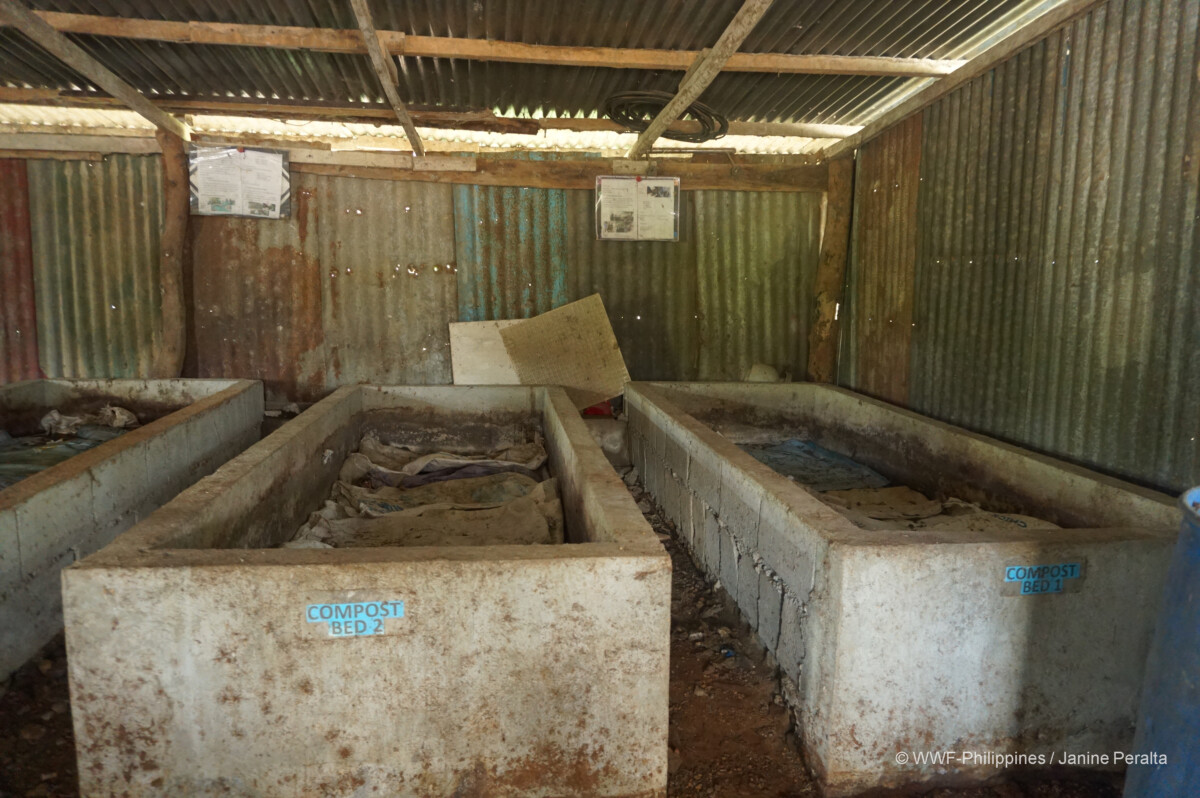
Food waste such as rotting fruits and vegetables are placed in composting beds and converted into fertilizer
WWF Philippines conducted a roadmap study on the EPR system in 2020 that was able to integrate the informal waste sector as well as solid waste management infrastructure – Materials Recovery Facilities (MRF), junk shops, and recycling facilities.
Sherryl stressed that the waste management sector wants to play a big role in the process of achieving the changes they hope to see through the new law, Extended Producer Responsibility (EPR), but it is a challenge to her team when businesses do not know how to segregate their waste.
“We can play the role of collecting waste and partner with producers in the recycling aspect. We can also handle the Material Recovery Facility operation after the collection. Right now, the challenges we are facing in our sector is the poor management of waste, lack of awareness in proper waste segregation,” said Sherryl. “Even the established businesses still cannot handle their waste properly.”
About WWF-Philippines:
The World Wide Fund for Nature Philippines is an environmental non-government organization committed to create an impact on biodiversity protection and responding to the climate crisis -towards a safe and just recovery. WWF-Philippines works with a host of partners including national and local governments, to co-create inclusive, innovative, and interdisciplinary solutions that emphasize the role of science in the service of life.
WWF-Philippines' focus is on scaled solutions with our partners to match the enormity of the tasks required to address the urgent environmental challenges facing the present and next generations of Filipinos. Its mission is "to stop, and eventually reverse the accelerating degradation of the Philippine environment – to build a future where Filipinos live in harmony with nature."
For more information, please contact:
Ms. Czarina Constantino-Panopio
National Lead, No Plastics in Nature Initiative
cconstantino@wwf.org.ph
For media arrangements, please contact:
Ms. Chezka Guevarra
Assistant Manager for External Communications and Ambassador Programs
09276566436
cguevarra@wwf.org.ph
